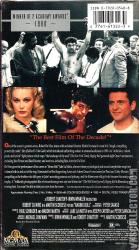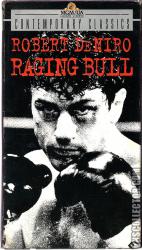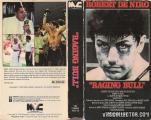Raging Bull
Catalog Number
M201322
-
Primary Distributor (If not listed, select "OTHER")
Catalog Number
M201322
Primary Distributor (If not listed, select "OTHER")
Distributor Series
Release Year
Country
N/A (NTSC)
N/A | N/A | N/A
N/A | N/A
Raging Bull (1980)
Additional Information
Additional Information
Martin Scorsese's brutal character study incisively portrays the true rise and fall and redemption of middleweight boxer Jake La Motta, a violent man in and out of the ring who thrives on his ability (and desire) to take a beating. Opening with the spectacle of the over-the-hill La Motta (Robert De Niro) practicing his 1960s night-club act, the film flashes back to 1940s New York, when Jake's career is on the rise. Despite pressure from the local mobsters, Jake trusts his brother Joey (Joe Pesci) to help him make it to a title bout against Sugar Ray Robinson the honest way; the Mob, however, will not cave in. Jake gets the title bout, and blonde teenage second wife Vickie (Cathy Moriarty), but success does nothing to exorcise his demons, even as he channels his rage into boxing. Alienating Vickie and Joey, and disastrously gaining weight, Jake has destroyed his personal and professional lives by the 1950s. After he hits bottom, however, Jake emerges with a gleam of self-awareness, as he sits rehearsing Marlon Brando's On the Waterfront speech in his dressing room mirror: "I coulda been a contender, I coulda been somebody." Working with a script adapted by Mardik Martin and Paul Schrader from La Motta's memoirs, Scorsese and De Niro sought to make an uncompromising portrait of an unlikable man and his ruthless profession. Eschewing uplifting Rocky-like boxing movie conventions, their Jake is relentlessly cruel and self-destructive; the only peace he can make is with himself. Michael Chapman's stark black-and-white photography creates a documentary/tabloid realism; the production famously shut down so that De Niro could gain 50-plus pounds. Raging Bull opened in late 1980 to raves for its artistry and revulsion for its protagonist; despite eight Oscar nominations, it underperformed at the box office, as audiences increasingly turned away from "difficult" films in the late '70s and early '80s. The Academy concurred, passing over Scorsese's work for Best Director and Picture in favor of Robert Redford and Ordinary People, although De Niro won a much-deserved Oscar, as did the film's editor, Thelma Schoonmaker. Oscar or no Oscar, Raging Bull has often been cited as the best American film of the 1980s.
Raging Bull is a 1980 American biographical sports drama art film directed by Martin Scorsese, produced by Robert Chartoff and Irwin Winkler and adapted by Paul Schrader and Mardik Martin from Jake LaMotta's memoir Raging Bull: My Story. It stars Robert De Niro as Jake LaMotta, an Italian American middleweight boxer whose sadomasochistic rage, sexual jealousy, and animalistic appetite destroyed his relationship with his wife and family. Also featured in the film are Joe Pesci as Joey, La Motta's well-intentioned brother and manager who tries to help Jake battle his inner demons; and Cathy Moriarty as his abused wife. The film features supporting roles from Nicholas Colasanto, Theresa Saldana and Frank Vincent.
Scorsese was initially reluctant to develop the project, though he eventually came to relate to La Motta's story. Schrader re-wrote Martin's first screenplay, and Scorsese and De Niro together made uncredited contributions thereafter. Pesci was an unknown actor prior to the film, as was Moriarty, who was suggested for her role by Pesci. During principal photography, each of the boxing scenes was choreographed for a specific visual style and De Niro gained approximately 60 pounds (27 kg) to portray La Motta in his later post-boxing years. Scorsese was exacting in the process of editing and mixing the film, expecting it to be his last major feature.
After receiving mixed initial reviews (and criticism due to its violent content), it went on to garner a high critical reputation and now to a very large extent is regarded among the greatest films ever made, including by Roger Ebert of the Chicago Sun-Times, Gene Siskel of the Chicago Tribune, renowned British film historian Leslie Halliwell, the American Film Institute, Time magazine, The New York Times, Variety, Entertainment Weekly, Empire magazine, Total Film, Film 4, and BFI's Sight and Sound. It was listed in the National Film Registry in 1990, its first year of eligibility.
Release Date: November 14, 1980 @ The Cinema I
Distrib: United Artists
Boxoffice: $23,334,953 2013: $68,877,100
Raging Bull is a 1980 American biographical sports drama art film directed by Martin Scorsese, produced by Robert Chartoff and Irwin Winkler and adapted by Paul Schrader and Mardik Martin from Jake LaMotta's memoir Raging Bull: My Story. It stars Robert De Niro as Jake LaMotta, an Italian American middleweight boxer whose sadomasochistic rage, sexual jealousy, and animalistic appetite destroyed his relationship with his wife and family. Also featured in the film are Joe Pesci as Joey, La Motta's well-intentioned brother and manager who tries to help Jake battle his inner demons; and Cathy Moriarty as his abused wife. The film features supporting roles from Nicholas Colasanto, Theresa Saldana and Frank Vincent.
Scorsese was initially reluctant to develop the project, though he eventually came to relate to La Motta's story. Schrader re-wrote Martin's first screenplay, and Scorsese and De Niro together made uncredited contributions thereafter. Pesci was an unknown actor prior to the film, as was Moriarty, who was suggested for her role by Pesci. During principal photography, each of the boxing scenes was choreographed for a specific visual style and De Niro gained approximately 60 pounds (27 kg) to portray La Motta in his later post-boxing years. Scorsese was exacting in the process of editing and mixing the film, expecting it to be his last major feature.
After receiving mixed initial reviews (and criticism due to its violent content), it went on to garner a high critical reputation and now to a very large extent is regarded among the greatest films ever made, including by Roger Ebert of the Chicago Sun-Times, Gene Siskel of the Chicago Tribune, renowned British film historian Leslie Halliwell, the American Film Institute, Time magazine, The New York Times, Variety, Entertainment Weekly, Empire magazine, Total Film, Film 4, and BFI's Sight and Sound. It was listed in the National Film Registry in 1990, its first year of eligibility.
Release Date: November 14, 1980 @ The Cinema I
Distrib: United Artists
Boxoffice: $23,334,953 2013: $68,877,100
Related Links
Related Releases1
Catalog Number
4523-30
Primary Distributor (If not listed, select "OTHER")
Raging Bull (1980)
Release Year
Catalog Number
4523-30
Primary Distributor (If not listed, select "OTHER")
Catalog Number
4523-30









Comments0
Login / Register to post comments